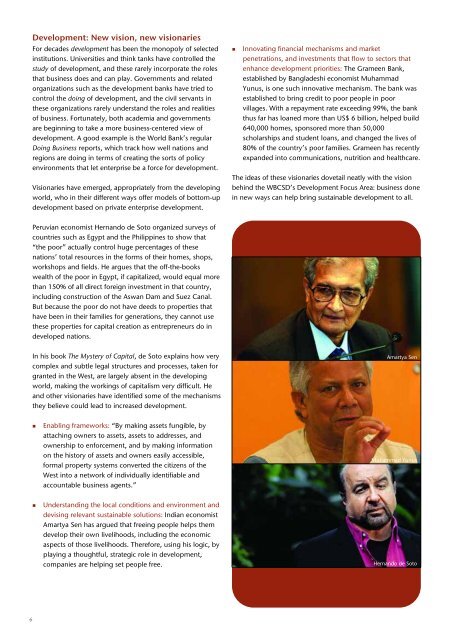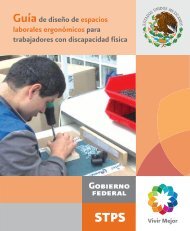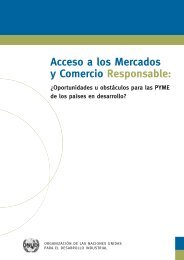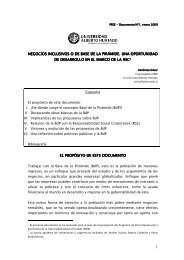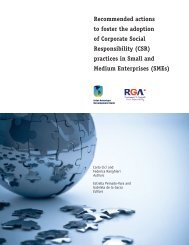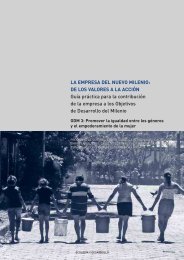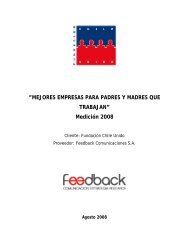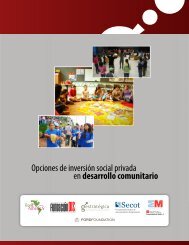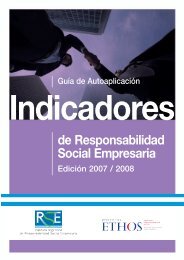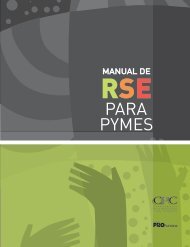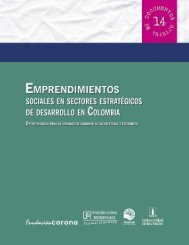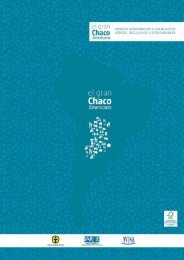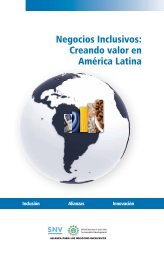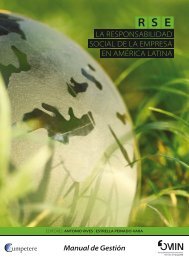Doing Business with the World - Mapeo de Promotores de RSE
Doing Business with the World - Mapeo de Promotores de RSE
Doing Business with the World - Mapeo de Promotores de RSE
You also want an ePaper? Increase the reach of your titles
YUMPU automatically turns print PDFs into web optimized ePapers that Google loves.
Development: New vision, new visionariesFor <strong>de</strong>ca<strong>de</strong>s <strong>de</strong>velopment has been <strong>the</strong> monopoly of selectedinstitutions. Universities and think tanks have controlled <strong>the</strong>study of <strong>de</strong>velopment, and <strong>the</strong>se rarely incorporate <strong>the</strong> rolesthat business does and can play. Governments and relatedorganizations such as <strong>the</strong> <strong>de</strong>velopment banks have tried tocontrol <strong>the</strong> doing of <strong>de</strong>velopment, and <strong>the</strong> civil servants in<strong>the</strong>se organizations rarely un<strong>de</strong>rstand <strong>the</strong> roles and realitiesof business. Fortunately, both aca<strong>de</strong>mia and governmentsare beginning to take a more business-centered view of<strong>de</strong>velopment. A good example is <strong>the</strong> <strong>World</strong> Bank’s regular<strong>Doing</strong> <strong>Business</strong> reports, which track how well nations andregions are doing in terms of creating <strong>the</strong> sorts of policyenvironments that let enterprise be a force for <strong>de</strong>velopment.Visionaries have emerged, appropriately from <strong>the</strong> <strong>de</strong>velopingworld, who in <strong>the</strong>ir different ways offer mo<strong>de</strong>ls of bottom-up<strong>de</strong>velopment based on private enterprise <strong>de</strong>velopment.Innovating financial mechanisms and marketpenetrations, and investments that flow to sectors thatenhance <strong>de</strong>velopment priorities: The Grameen Bank,established by Bangla<strong>de</strong>shi economist MuhammadYunus, is one such innovative mechanism. The bank wasestablished to bring credit to poor people in poorvillages. With a repayment rate exceeding 99%, <strong>the</strong> bankthus far has loaned more than US$ 6 billion, helped build640,000 homes, sponsored more than 50,000scholarships and stu<strong>de</strong>nt loans, and changed <strong>the</strong> lives of80% of <strong>the</strong> country’s poor families. Grameen has recentlyexpan<strong>de</strong>d into communications, nutrition and healthcare.The i<strong>de</strong>as of <strong>the</strong>se visionaries dovetail neatly <strong>with</strong> <strong>the</strong> visionbehind <strong>the</strong> WBCSD’s Development Focus Area: business donein new ways can help bring sustainable <strong>de</strong>velopment to all.Peruvian economist Hernando <strong>de</strong> Soto organized surveys ofcountries such as Egypt and <strong>the</strong> Philippines to show that“<strong>the</strong> poor” actually control huge percentages of <strong>the</strong>senations’ total resources in <strong>the</strong> forms of <strong>the</strong>ir homes, shops,workshops and fields. He argues that <strong>the</strong> off-<strong>the</strong>-bookswealth of <strong>the</strong> poor in Egypt, if capitalized, would equal morethan 150% of all direct foreign investment in that country,including construction of <strong>the</strong> Aswan Dam and Suez Canal.But because <strong>the</strong> poor do not have <strong>de</strong>eds to properties thathave been in <strong>the</strong>ir families for generations, <strong>the</strong>y cannot use<strong>the</strong>se properties for capital creation as entrepreneurs do in<strong>de</strong>veloped nations.In his book The Mystery of Capital, <strong>de</strong> Soto explains how verycomplex and subtle legal structures and processes, taken forgranted in <strong>the</strong> West, are largely absent in <strong>the</strong> <strong>de</strong>velopingworld, making <strong>the</strong> workings of capitalism very difficult. Heand o<strong>the</strong>r visionaries have i<strong>de</strong>ntified some of <strong>the</strong> mechanisms<strong>the</strong>y believe could lead to increased <strong>de</strong>velopment.Amartya SenEnabling frameworks: “By making assets fungible, byattaching owners to assets, assets to addresses, andownership to enforcement, and by making informationon <strong>the</strong> history of assets and owners easily accessible,formal property systems converted <strong>the</strong> citizens of <strong>the</strong>West into a network of individually i<strong>de</strong>ntifiable andaccountable business agents.”Muhammad YunusUn<strong>de</strong>rstanding <strong>the</strong> local conditions and environment and<strong>de</strong>vising relevant sustainable solutions: Indian economistAmartya Sen has argued that freeing people helps <strong>the</strong>m<strong>de</strong>velop <strong>the</strong>ir own livelihoods, including <strong>the</strong> economicaspects of those livelihoods. Therefore, using his logic, byplaying a thoughtful, strategic role in <strong>de</strong>velopment,companies are helping set people free.Hernando <strong>de</strong> Soto6


